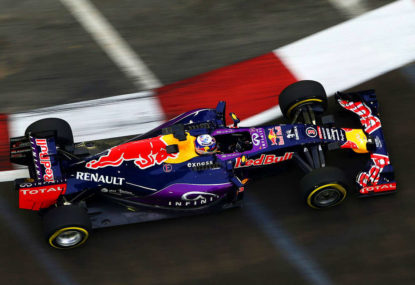'Welcome back': Reliving the last Chinese Grand Prix ahead of its much-anticipated return five years later
Five-years is a long time in motorsport, let alone the general state of the world – especially given the impact of the Covid-19 pandemic…

There’s trouble brewing in the Formula One paddock with accusations surfacing that Ferrari has offered Red Bull the current engine to run in competition next year.
Red Bull have earned no fans with their recent behaviour, throwing their long-time partner Renault under the bus following a long and, by any measure, successful relationship.
What seems to have sealed Red Bull’s fate is their ruthless assassination of Renault; now neither Mercedes nor Ferrari want anything to do with them. In the best case scenario the boffins at Red Bull will create another world beating car, and in the worst case scenario the engine manufacturer is uncompetitive and is chained to ‘the Bull’s hind legs’ and dragged through the mud.
Red Bull’s behaviour aside, this problem isn’t entirely their own doing.
Over the years, in a bid to attract more sponsors, races and punters to the grid, the Formula One brains trust have allowed the teams more and more say in how the sport has been run. The Formula One strategy group allows the front running teams to dictate, for the rest of the grid at least, the direction of the sport on issues like engine regulations, cost capping, wind tunnel bans, and so on and so forth.
In any other sport, perhaps with the exception of cricket where the primary responsibility of the ICC is keeping the Indian Cricket Board happy, the idea of allowing the competitors to dictate the rules would be laughable.
We can’t pin all of Formula One’s problems on the teams, absurdities like the final double-points round last year shows that the guardians of the sport sometimes make mistakes too.
Until last year, Red Bull showed that a car with a customer engine not only worked, but can be brilliantly successful. If you read articles from early 2014, before the Red Bull owners started throwing their toys out of the cot, nobody would deny that Renault’s usual reliability and performance had abandoned them. To disregard Red Bull’s complaints at this stage would be akin to denying Mclaren their grievances with Honda.
Just as the tyre pressure saga from the Belgian Grand Prix did, the engine situation has exposed the engine supplier agreements: there’s no regulation that says if you supply an engine to a competitor it must be as developed and advanced as your own. Indeed, the smaller teams rely on buying cheaper, old-spec engines to keep their operating costs down.
All Red Bull wants is an engine that is capable of winning, and of the four suppliers there are two engines that could possibly do that and these two suppliers service a total of seven teams on the grid (six when Renault complete their buy-out of Lotus who switched from Renault engines to Mercedes this year).
To whom Mercedes and Ferrari choose to sell their engines is their business, and if they don’t want to offer any assistance to a rival I can completely understand. But for the FIA to leave a team’s fate in the hands of a competitor is preposterous.
Perhaps, just as they should with the regulations, the governing body should wrestle control back from the teams by either enforcing a uniform engine supply regulation or providing an alternative option for the supply of power units: an impartial third party that offers affordable, top-performing engines to anyone without looking after their own vested interests.
Despite Mercedes’ recent dominance, realistically there are four teams battling for the podium positions, and right now two of them are afraid of a fair fight. To considered a worthy champion you should be willing to take on and beat the best, but that’s not the message coming from the works operations at the moment.
Put it this way, try to think of the last time a customer team or driver won the championship, I can’t think of any in recent decades!
The unity of having both a car and engine rolling out of the same factory should not be underestimated.